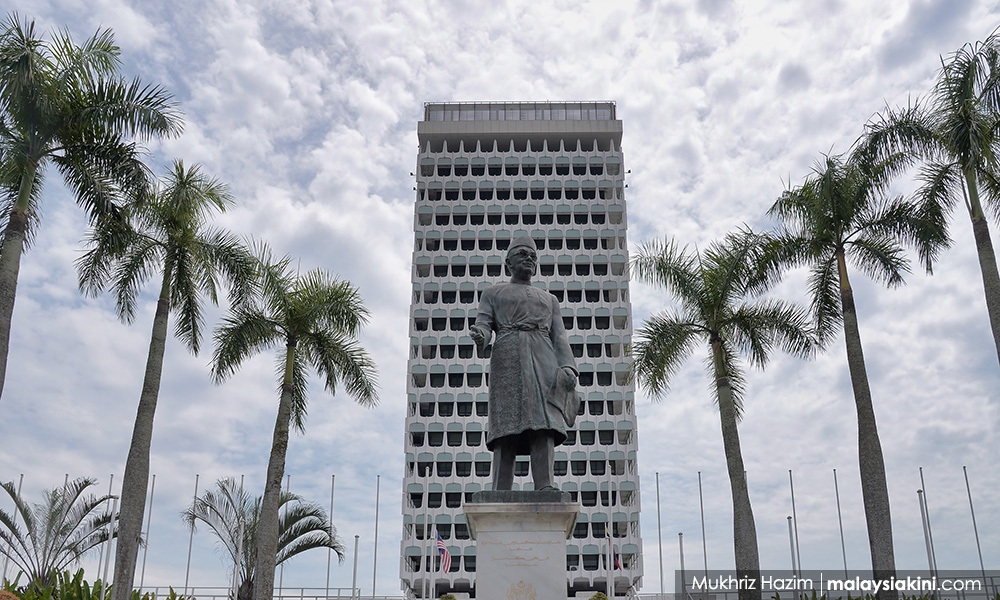While Hari Raya is generally a happy time for many Malaysians, families of those on death row see the holiday as a marker for another year passed on their loved ones’ long road to justice.
For Siti, 36, this is what she called the “seventh Ramadan” since her father Amiruddin Abdullah was placed on death row.
Since then, she has gotten married and given birth - all the while going back and forth making regular trips on her own from Negeri Sembilan to Sungai Buloh prison to visit her father.
“If you follow the Islamic calendar, it's the seventh Ramadan (since he was taken away), so it's really difficult.
“He was charged under Section 39(b) (of the Dangerous Drugs Act) and he cannot be bailed out. One of the challenges we face is the length of the legal procedure. My father's health is another challenge we face.
“In terms of money, we are struggling and we were initially getting (legal) help from (Deputy Law Minister) Ramkarpal (Singh), but now that he is a minister, he can't practice,” said Siti.
She added that the protracted wait to receive her father’s ruling - now scheduled for June 26 - has been an emotional ride.
“This journey has been delayed again and again. It is a struggle in that sense, lah,” she said.
Amiruddin, 63, was caught using medical marijuana to treat his cancer and charged with Section 39(b) of the Dangerous Drugs Act 1952, which carries a mandatory death penalty.
The wheelchair-bound army veteran was slapped with 16 counts of charges, for allegedly distributing 77.84 kilograms of cannabis.

Amiruddin also faced 18 counts of cultivating cannabis under Section 6B of the same Act, which carries life imprisonment and whipping.
On top of that, the senior citizen also faced four charges of possessing marijuana and another one for inserting cannabis in the body.
Amiruddin was charged under Section 6 and Section 15(1) under the same Act respectively.
Amiruddin is now represented by Ramkarpal’s sister, Sangeet Kaur.
Abolishment of mandatory death penalty
In recent times, the country has moved towards limiting the death penalty after Dewan Rakyat recently passed the Abolition of Mandatory Death Penalty Bill 2023.
The bill effectively removed the mandatory death penalty provision for 11 offences, including drug trafficking, murder, treason and terrorism.
On April 11, Dewan Negara ratified this and with a moratorium on executions in place since 2018, Malaysia has not executed a prisoner for nearly six years.
There is also an indication that the country may move towards total death penalty abolition in the future.
For now, the new laws do not eliminate the death penalty altogether but will instead allow judges to use their discretion in imposing penalties that are proportionate to the crime that was committed, including the death penalty, where necessary.
Death penalty proponents have held campaigns to oppose such amendments.

However, for individuals like Siti, the amendment is a welcome move, as the death penalty is relevant to the charges in her father's case.
Siti believes the death penalty should not fall on those with drug-related charges.
“I don't support these drug cases. My father’s case actually involves hemp - which you can buy legally in health products at commercial stores - but because hemp is related to the cannabis family, my father’s construed to be some big drug dealer.
“I support continuing the death penalty for rapists and murderers because in Islam, if the lives and dignity of people are affected, the death penalty then becomes relevant but I don’t believe it should be used for drug cases,” said the Port Dickson native.
Siti noted many countries have abolished the mandatory death penalty - with Malaysia being one of the latest to follow suit.
“For me, it is necessary to look at it on a case-by-case basis. For example, using drugs in small quantities, hanging is too much of a penalty. They should be given the space and opportunity to change if they really did the crime.
“Those without money to hire a lawyer are often forced to plead guilty. For us, we were waist-deep in debt, forced to pawn our belongings, to take care of our father who was being persecuted.
“Before our family was affected, we thought that those imprisoned are truly criminals and are all bad, but it is not necessarily the case,” she said.
More than 1,300 people facing the death penalty or life imprisonment in Malaysia - including those who have exhausted all legal appeals - can seek a sentencing review under the new rules passed recently.
The amendments apply to 34 offences currently punishable by death, including murder and drug trafficking. Eleven of those have stipulated death as the mandatory punishment.
For now, life imprisonment sentences, defined by law as a fixed term of 30 years, will be retained.
Efficacy of capital punishment
The death penalty has been a part of the Malaysian criminal justice system since the days of British colonial rule.
In 1957, following Malaya’s independence, the nation inherited the common law system - which includes the death sentence.
Initially, the Dangerous Drugs Act was passed in 1952 to combat the threat of substance abuse.

However, the use of the death penalty for drug trafficking - which falls under Section 39B - was only enforced in 1975, with it remaining discretionary for the section until 1983 when it was made mandatory.
Given the 40 years since it has been made mandatory, Siti questioned its efficacy in deterring drug distribution.
“Malaysia has implemented mandatory capital punishment for four decades, many netizens are saying that many more people will commit crimes - with crime cases increasing and many will become drug mules and so on.
“But despite these four decades (of having the mandatory sentence), drug cases were increasing regardless. People still commit crimes, people still sell drugs.
“If the punishment is big, that thing will be expensive, so desperate people will try to sell or distribute it.
“With Malaysia’s economy not doing well, many people are desperate to move towards (crimes like) distribution.
“In my opinion, if the death penalty had worked in the last four decades, there would be no drug trafficking now,” said Siti. - Mkini



No comments:
Post a Comment
Note: Only a member of this blog may post a comment.